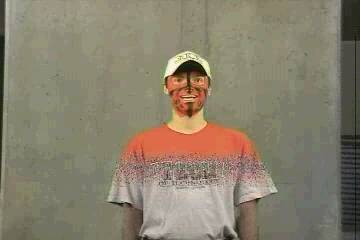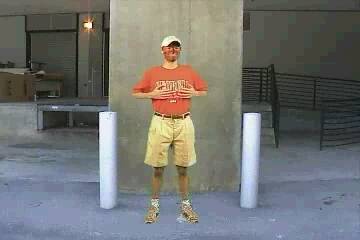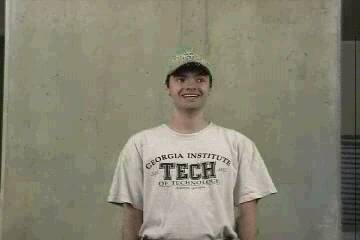In
a Nutshell
CS 4480 - Group 2
Spring 2000
Morph
Using an Elegant Cross-Dissolve
by Greg Wright,
Shinan Kassam, and Jason Etheridge
Click on the image above to view our movie.
Our code takes in two
AVI files, where the first file is the starting image (before the morph), and
the second file is the final image (after the morph). In our movie, we morphed
a UGA "alien" into a Georgia Tech student, and we also morphed the
respective school logos (see below).
|
|
The first image is of a UGA student. We filmed an actor in front of a bluescreen for this video. In the original footage, he moves in slow motion so that we can match up his motion in the two videos. After we shot the footage, we removed the blue background and replaced it with a pure green background (RGB 0/255/0) so that our code knows where to put noise during the morph sequence. |
|
|
The second image is of a Tech student, using the same actor in different clothes (thank goodness!!!) Here, we have matched his current position with his position as a UGA student. We accomplished this using the Sony TRV900's "Flash" feature which allowed us to keep a still image on top of the current view. |
 |
This is the morph about midway through. The code has taken in the two image sequences described above and composited parts of the second one onto the first one. We defined multiple rectangular regions that do not overlap, but together cover the entire image (720x360 in DV). The bottom region is the second image, fully opaque. The top region is the first image, fully opaque. All the regions between the top and bottom are some mixture of each image. Then, we added random noise on top of the morph. The amount of noise in the center of the morph (i.e. 50% of each image) is maximum, and decreases moving away from the center. The noise gives a neat effect, draws the viewers eye toward where the morph is happening, and covers up any lines caused by the regions or imperfections in the actor's different positions. After we ran our code (in VideoMunger) on the two input files, we imported the output file into our movie in Adobe After Effects. We then composited the sequence on top of a background (a building in this case) and removed the pure green background.
|
 |
Here is the morph applied to the UGA and Georgia Tech logos. |


